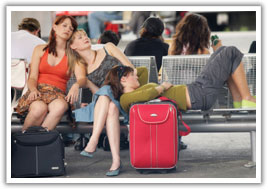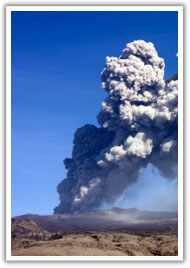What Can Go Wrong?
All travel companies operate as commercial organisations, aiming to make a profit. In difficult trading conditions, when sales are low or costs rise, it is not possible for the organisation to continue to operate. When this happens the company ceases trading, becomes insolvent and goes into liquidation. This can happen to travel agencies, tour operators or airlines.

One of the unique features of many travel companies is that the money is paid by the customer to the company some time before the product is consumed. Many flights and holidays are paid for weeks or months before they are taken. This raises the issue of the protection of the customer’s money if the travel company or airline goes out of business after the money has been paid by the customer.
Over the last few years, economic conditions have become more difficult. Oil prices (which determine the cost of aircraft fuel) have become less stable and the general downturn in the world economy has affected a number of travel companies. In addition natural events such as volcanic dust clouds and strikes have had impacts on the travel and tourism industry.
Each year a number of travel companies go out of business. The companies below are examples of travel organisations which have ceased trading in recent years.
- Zoom Airways
- Silverjet
- XL Leisure
- Sun4u
- Goldtrail
- Kiss Flights
In each of these cases, and others, many travellers were left stranded abroad and had to make alternative arrangements to return home. Others had their flights or holidays cancelled at the last minute, or had to make alternative arrangements at their own expense.
Activity 1
Use the link below to the BBC website to explore what happened when the travel companies Goldtrail, Sun4u and Kiss Flights collapsed in the summer of 2010. Follow the links to other items about the collapse of the companies.

http://www.bbc.co.uk/news/business-11009132
Activity 2
Having followed the links, identify 6 different ways in which customers who have booked flights with companies which collapse could be affected.
Activity 3
The link below provides further information about what happens when tour operators and airlines cease trading:
http://www.bbc.co.uk/watchdog/consumer_advice/latest_travel_emp.shtml
Summarise the information provided by the BBC 'Watchdog' link.
Customers’ money paid to travel companies before they travel is protected far more than it was in the past. The general situation is:
- 'Package holidays' involving flights are protected by the ATOL scheme, operated by the CAA.
- ABTA and other trade associations operate ‘bond’ schemes which protect the money paid to travel agents.
- People booking flights directly with airlines are not protected by the ATOL scheme. Airline failure insurance is now available to cover this situation.
- Generally, those making their own travel arrangements independently are more at risk than customers booking through bonded travel agents.
- Bookings paid for with a credit card are protected by the Consumer Credit Act.
Many people are not aware of the precise situation regarding the protection of their money when they make their travel bookings. For example, they may not be aware of the ‘small print’ in their travel insurance and the circumstances for which they are covered.
The link below to an article in the Daily Mail shows the confusion about Scheduled Airline Failure Insurance (SAFI).
http://www.dailymail.co.uk/travel/article-611813/What-airline-collapses.html

Activity 4
Identify the three major points made by the Daily Mail article.
Although regulations have been put in place to protect the money paid by customers to travel companies, situations often occur over which the industry has no control, leading to cancellations and disruption. Bad weather in winter or unusual events, such as the dust created by the volcanic eruption in Iceland, may lead customers to lose money or to claim on their travel insurance. The exact situation will vary from customer to customer.
The links below provide more information about what might happen.
http://news.bbc.co.uk/1/hi/world/europe/8630145.stm
http://www.guardian.co.uk/money/2010/apr/15/iceland-volcano-travel-insurance
It does seem that people booking packages through ATOL bonded companies or using ABTA bonded travel agents have more security than those making independent bookings directly with airlines and accommodation providers.
The growth of budget airlines and the ease of using the internet to make online bookings have encouraged the growth of independent bookings. It is very easy to make flight bookings for a weekend break to Barcelona, for example, and to make an online reservation with a hotel in the city.
However, if the airline ceased trading the day before the holiday was to be taken, money paid for the flights and the accommodation could be lost, depending on what insurance had been taken out and the precise situation.
A similar holiday booked as a package through a travel agency such as Travel Stop would be covered by the ATOL of the tour operator with which Travel Stop is dealing.
Also, if travel arrangements had to be changed at short notice, the experienced staff of Travel Stop would be able to support the customer and make alternative arrangements.
Summary
- ATOL, ABTA bonds and various forms of travel insurance are used to protect the money paid to travel companies.
- Those customers booking online directly with airlines and other providers are generally more at risk.
- When things go wrong, the experience of staff employed by travel agencies such as Travel Stop is vital in helping customers make new arrangements.